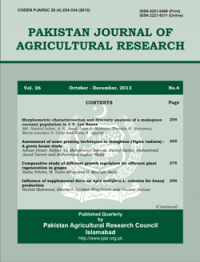Evaluation of Quantitative and Qualitative Attributes of Forage Sorghum Irrigated with Saline Water
Evaluation of Quantitative and Qualitative Attributes of Forage Sorghum Irrigated with Saline Water
Aftab Ahmad Sheikh1, Khalil Ahmed1*, Belqees Akhter1, Ghulam Qadir1, Muhammad Qaisar Nawaz1, Hafeezullah Rafa1, Abdul Wakeel1, Abdul Manan Saeed2
ABSTRACT
High population growth rates, shortage of fresh water, and threat of climatic change are major constrains for expansion of irrigated agriculture in the country. In this scenario, use of underground saline water for crop production with acceptable economic yield is a viable management strategy. Therefore, a lysimeter study was conducted to evaluate the effects of saline water on quality and quantity of forage sorghum (Sorghum bicolor L.). Forage sorghum was sown in cemented blocks and five increasing levels of saline water (0.30, 4, 6, 8 and 10 dS m-1) were used to irrigate the crop. Data regarding the plant height, fresh/dry fodder yield, nitrogen free extracts (NFE), crude fat, crude protein, crude fiber, phosphorus, and calcium contents were envaulted at the physiological maturity of crop, four months after the sowing of crop. Results revealed that water salinity adversely affected the quantitative and qualitative attributes of sorghum crop and negative effects were more pronounced with higher level of salinity ECiw (10 dS m-1). Irrigation with higher level of salinity ECiw (10 dS m-1) decresed the plant height (9%), fresh fodder yield (16.21%), dry biomass yield (7.86%), crude fat (25.40%) and crude protein (17.94%) as compared to control. Results also showed that water salinity of 4 dS m-1 did not decreased most of the studied parameters as compared with control. Therefore. it was concluded that forage sorghum can grow successfully without any significant loss in yield and acceptable fodder quality with water salinity of 4 dS m-1.
To share on other social networks, click on any share button. What are these?







